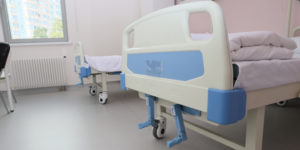Sensors, other steps could improve resident sleep
The use of telecare sensors could improve residents’ ability to sleep by reducing the need for in-person safety checks by nursing staff at night, which can be disruptive, according to a new study.
“Bed occupancy sensors, floor pressure sensors or enuresis sensors could alert a pager held by night staff,” the authors write in Nursing Older People. “Night care planning with individual residents could identify whether they would prefer visits by staff for checking, if this is necessary, or to discuss other options.”
Studying three nursing homes and a residential care home, the United Kingdom researchers found that safety checks as well as staffing levels and shift patterns can significantly affect residents’ ability to sleep well. Among their findings:
- Staffing levels affect the time at which some residents go to bed. Residents needing a hoist because of physical disability, for instance, often are assisted to bed by the members of day shift, when more staff members are available.
- Staff members at many facilities enter resident rooms regularly—sometimes hourly—to check on them.
- Some residents fear being prescribed sleeping medication and so will not mention sleeping problems to staff members.
- Physical disabilities can make going to bed a lengthy and painful process for residents, many of whom face difficulties in positioning their bodies so they are comfortable enough to sleep.
- Because of the risk of falling, nursing staff usually discourage residents from getting up independently at night if, for example, they wish to walk or get a hot drink.
Resources such as mp3 players, radio podcasts and audiobooks could occupy residents during wakeful periods at night, the authors suggest. Also, they add, all staff members, regardless of the shift on which they work, can offer emotional support to residents who, in quiet times, like to talk about their concerns.
“It can be useful if these anxieties are shared with day staff, and where possible, residents are supported to act on their problems and make changes to situations that are worrying them,” they say.
See other content by this author here.

Lois A. Bowers was senior editor of I Advance Senior Care / Long-Term Living from 2013-2015.
Related Articles
Topics: Clinical , Staffing , Technology & IT











